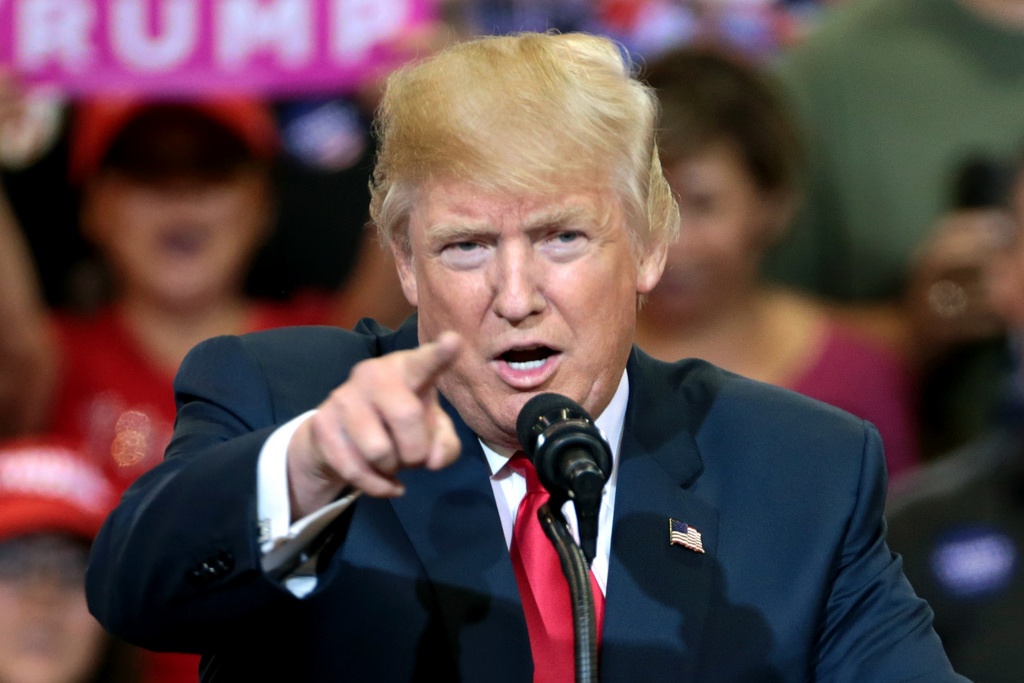Lifting political restrictions on churches would open the secret-money floodgates

President Trump has said he wants to "totally destroy" the Johnson Amendment, which bars charitable nonprofits from engaging in partisan politics. (Photo by Gage Skidmore via Flickr.)
For years, conservative evangelicals have been advocating for the repeal of the Johnson Amendment — the section of the U.S. Internal Revenue Code that prohibits charitable nonprofits from endorsing or opposing specific political candidates — claiming it infringes on their free speech rights.
They have found a key ally in President Donald Trump. Several times during his campaign, Trump made statements opposing the policy. And at the National Prayer Breakfast held earlier this month, he pledged to "get rid of and totally destroy the Johnson Amendment and allow our representatives to speak freely without fear of retribution."
The amendment was introduced as legislation in Congress in 1954 by then-U.S. Sen. Lyndon B. Johnson, Democrat of Texas. Johnson was running for re-election and his millionaire opponent, Republican rancher-oilman Dudley Dougherty, was endorsed by a conservative nonprofit group that was producing materials calling for Johnson's defeat. In response, Johnson proposed amending Section 501c3 of the federal tax code governing nonprofits to require that charitable organizations sidestep partisan politics in order to maintain their tax-exempt status. Uncontroversial at the time, the amendment became law on Aug. 16, 1954.
In making their case that the amendment infringes on their free speech rights, conservative evangelicals have cited the civil rights movement and how leaders like Rev. Dr. Martin Luther King Jr. often preached political messages from the pulpit. For example, Tony Perkins of the Family Research Council, a charitable nonprofit, released this statement following Trump's remarks at the National Prayer Breakfast:
Dr. Martin Luther King — the greatest 'political pastor' in the nation — spoke forcefully from the pulpit about how the issues of the day were to be driven by pastors and the people in pews. For the whole of American history, churches have been at the forefront of shaping debate and public policy. That's where they ought to stay. Pastors should be held accountable to God alone for what they say behind the pulpit, not the IRS.
But the history of the civil rights movement shows that the Johnson Amendment does not prevent religious leaders from tackling political issues. During the movement, the Black church — particularly in the South — was a hub of civic engagement. It was where mass meetings and planning for direct actions were held, and where Black ministers preached messages criticizing policies that deprived many Southern Blacks of voting and labor rights. And in fact, current law gives churches the liberty to criticize or support officeholders and speak out on policy issues. Additionally, religious leaders can endorse candidates in their individual capacity.
Furthermore, it's extremely rare for churches on either side of the political spectrum to lose their tax-exempt status under the Johnson Amendment. Since 2008, for instance, the anti-gay conservative group Alliance Defending Freedom has organized "Pulpit Freedom Sunday" in which pastors across the country preach partisan sermons and mail the transcripts to the IRS. Though over 2,000 pastors have participated, the IRS has only investigated once — and did not revoke that church's tax-exempt status.
So why is the Johnson Amendment being targeted? Follow the money, its defenders say.
Since donations to churches and other charitable nonprofits are tax-deductible and protected from public disclosure, repealing the amendment would lead to an influx of secret money into elections. Donors would be able to anonymously contribute to a church or other nonprofit, and that money could then be used to fuel a political campaign without having the donors' identities revealed — and they could receive a tax deduction as an added bonus.
"It could effectively turn churches into campaign offices and pastors into party operatives," said Robert P. Jones, CEO of the Public Religion Research Institute.
But churches wouldn't be the only nonprofits affected. An analysis released this week by Public Citizen found that at least five groups in favor of dismantling the Johnson Amendment — the National Right to Life Committee, Susan B. Anthony List, Focus on the Family and the National Organization for Marriage, along with the Family Research Council — have spent $24 million to influence federal, state and local elections since 2006. The Family Research Council and Focus on the Family are charitable nonprofits, and the National Organization for Marriage and National Right to Life Committee have charitable nonprofit arms. As a 501c4 "social welfare" nonprofit, the Susan B. Anthony List is already allowed limited engagement in partisan politics.
Given that exit polls showed that Trump carried 58 percent of the evangelical vote, it's no surprise that he wants to repeal the amendment. But his options for doing that are limited.
Because the Johnson Amendment is part of the federal tax code, Trump cannot repeal it through executive order. However, he can issue an executive order directing the IRS to interpret the law narrowly, effectively giving churches the ability to endorse candidates.
A repeal would have to be done by Congress — and legislation has been introduced that would do just that.
The day before Trump spoke at the National Prayer Breakfast, the Free Speech Fairness Act was introduced in both the House and the Senate to allow any charity to endorse or oppose candidates as long as the endorsement occurs "in the ordinary course of the organization's regular and customary activities." The initial co-sponsors of the legislation in the House were Steve Scalise of Louisiana and Jody Hice of Georgia, and in the Senate they were James Lankford of Oklahoma and Rand Paul of Kentucky, all Republicans.
The legislation has been assigned to the Senate Finance Committee, chaired by Utah's Orrin Hatch, and the House Ways and Means Committee, chaired by Kevin Brady of Texas.
Tags
Rebekah Barber
Rebekah is a research associate at the Institute for Southern Studies and writer for Facing South.
